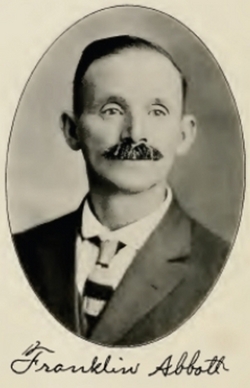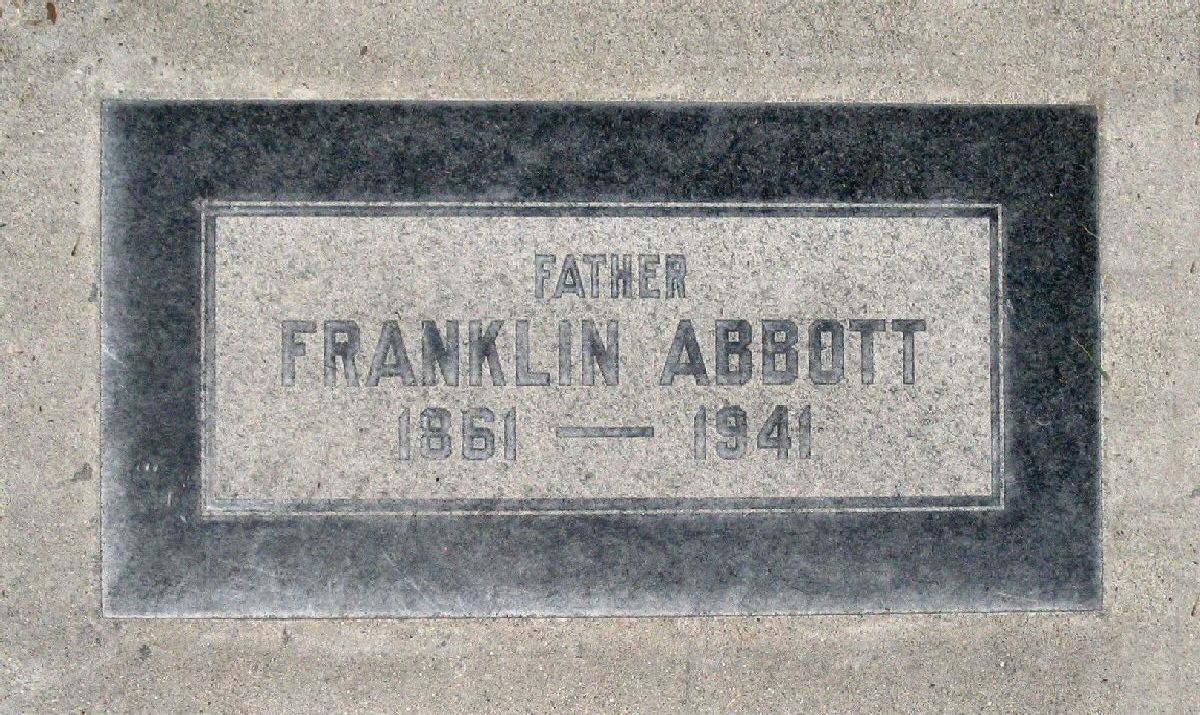Another one from the 1919 book.
An old settler who has passed through the hardest of hard times, experiencing the failure of grain crops, and starvation prices for that upon which much time and fatiguing labor had been expended, and who, having borne his trials manfully, has won success as a viticulturist was Franklin Abbott, the subject of this review. Mr. Abbott was also an expert teamster and judge of land and cattle, and raised horses and mules for twenty-eight years, having come to Fresno in the early eighties. He was "born near Bloomington, McLean County, Ill., on February 10, 1861, the son of Milo J. Abbott, a native of Maine, who came to Illinois and there settled as a farmer, about 1881 removing to Kansas, and while living at Garden City he died. Milo's wife was Adeline Burt before her marriage, and her native state was New Hampshire. She proved the best of helpmates to her husband, and ended a useful career in Illinois, the mother of thirteen children. One of the sons, Andrew, came to Fresno about 1880, and is a rancher at Del Rev. Franklin was the seventh eldest and grew up on a farm in Illinois. He attended the country schools and remained at home until he was sixteen. Then he went to work for his brother, so that, fortunate in such an advisor, he secured an excellent start for the great tussle with the world. In 1882 the young man came west to California and made his way to Fresno County. Fresno itself was then only a small place with two stores, and the whole country about was a wide stretch of plain, with cattle and sheep, so he went to work in a vineyard and orchard in Washington Colony, where he remained
"busy until spring, when he went to the mountains with a band of sheep for his cousin, George Rowell. He spent two summers in the mountains in caring for herds, and even if he had gotten nothing else out of the experience, he built up his health and intensified his love for California outdoor life. Then Mr. Abbott started for himself as a farmer. He bought an outfit and a ten-mule team, and for two years leased land from Dr. Rowell in the Washington Colony. Then he leased 1,200 acres of the Simpson ranch near Academy, and later the Dickinson ranch of 1,500 acres on Dry Creek. For fourteen years he continued there, and in that time raised some big crops. He had some failures, due to the low selling prices, being compelled to dis- pose of his barley at times at only ten dollars a ton, White Australian wheat at seventy-three cents a cental, and Sonora wheat at sixty-three cents, so that when he came to balance up, at the end of that time, he found that if he had worked out in the service of others, at twenty-five dollars a month for the fourteen years, he would have been better off than he was through his own enterprise. He raised mules and horses, as many as seventy to 100 head a year, and also cattle, and was rated as doing considerable business. Whatever his luck, he never grumbled; nor did he resort to the "flowing bowl" to drown his disappointment. He found that nothing paid better than
to cheerfully peg away. Reflecting on his past experience, Mr. Abbott determined to buy a small place. In the fall of 1905, therefore, he purchased his present holding of forty acres in the Barstow Colony, and at once began to improve it. He set out twenty acres in peaches and the next year a vineyard and a fine tract of alfalfa; but until the California Peach Growers, Inc., was formed, the price paid for peaches was so low that it was impossible to realize a profit. He belonged to that association, and through collective marketing his orchard enterprise is a success, as also are those of his fellow members. He had ten acres of alfalfa and eleven acres of Thompson and Malaga grapes, and was acknowledged to have one of the finest vineyards in the vicinity. This success must be the result, in part, of Mr. Abbott's excellent judgment in selecting his land which also wass well watered from the Herndon canal. He built a fine building, and set around the whole a border of figs. While at Academy, Mr. Abbott was married to Miss Maud Balev, a native of Oregon, but reared in this state, and the daughter of Henry Balev, a pioneer farmer of Fresno who made a specialty of raising fine standardbred horses. Nine children make up the family of Mr. and Mrs. Abbott: they
are: Gladys, Milburn, Beulah, Frances. Walter, Doris, Marie, Frank and Helen, and all are at home assisting in dispensing that welcome and hospitality for which the Abbott household has long been famous. They attended the Presbyterian Church at Barstow, of which Mr. Abbott was a steward,and contributed to the social-center life in the Barstow school, where Mr. Abbott served for three years as a trustee.
Independent in politics, Mr. Abbott performed much service for the common weal, and has twice served as deputy sheriff, under Sheriffs Chittenden and McSwain. He was an instructive talker and had many interesting reminiscences of the days that are gone, and remembered well when he hauled lumber from the mountains to Fresno, and also hauled provisions from Fresno to the mountains, a livelihood being maintained under anything but convenient circumstances.
Another one from the 1919 book.
An old settler who has passed through the hardest of hard times, experiencing the failure of grain crops, and starvation prices for that upon which much time and fatiguing labor had been expended, and who, having borne his trials manfully, has won success as a viticulturist was Franklin Abbott, the subject of this review. Mr. Abbott was also an expert teamster and judge of land and cattle, and raised horses and mules for twenty-eight years, having come to Fresno in the early eighties. He was "born near Bloomington, McLean County, Ill., on February 10, 1861, the son of Milo J. Abbott, a native of Maine, who came to Illinois and there settled as a farmer, about 1881 removing to Kansas, and while living at Garden City he died. Milo's wife was Adeline Burt before her marriage, and her native state was New Hampshire. She proved the best of helpmates to her husband, and ended a useful career in Illinois, the mother of thirteen children. One of the sons, Andrew, came to Fresno about 1880, and is a rancher at Del Rev. Franklin was the seventh eldest and grew up on a farm in Illinois. He attended the country schools and remained at home until he was sixteen. Then he went to work for his brother, so that, fortunate in such an advisor, he secured an excellent start for the great tussle with the world. In 1882 the young man came west to California and made his way to Fresno County. Fresno itself was then only a small place with two stores, and the whole country about was a wide stretch of plain, with cattle and sheep, so he went to work in a vineyard and orchard in Washington Colony, where he remained
"busy until spring, when he went to the mountains with a band of sheep for his cousin, George Rowell. He spent two summers in the mountains in caring for herds, and even if he had gotten nothing else out of the experience, he built up his health and intensified his love for California outdoor life. Then Mr. Abbott started for himself as a farmer. He bought an outfit and a ten-mule team, and for two years leased land from Dr. Rowell in the Washington Colony. Then he leased 1,200 acres of the Simpson ranch near Academy, and later the Dickinson ranch of 1,500 acres on Dry Creek. For fourteen years he continued there, and in that time raised some big crops. He had some failures, due to the low selling prices, being compelled to dis- pose of his barley at times at only ten dollars a ton, White Australian wheat at seventy-three cents a cental, and Sonora wheat at sixty-three cents, so that when he came to balance up, at the end of that time, he found that if he had worked out in the service of others, at twenty-five dollars a month for the fourteen years, he would have been better off than he was through his own enterprise. He raised mules and horses, as many as seventy to 100 head a year, and also cattle, and was rated as doing considerable business. Whatever his luck, he never grumbled; nor did he resort to the "flowing bowl" to drown his disappointment. He found that nothing paid better than
to cheerfully peg away. Reflecting on his past experience, Mr. Abbott determined to buy a small place. In the fall of 1905, therefore, he purchased his present holding of forty acres in the Barstow Colony, and at once began to improve it. He set out twenty acres in peaches and the next year a vineyard and a fine tract of alfalfa; but until the California Peach Growers, Inc., was formed, the price paid for peaches was so low that it was impossible to realize a profit. He belonged to that association, and through collective marketing his orchard enterprise is a success, as also are those of his fellow members. He had ten acres of alfalfa and eleven acres of Thompson and Malaga grapes, and was acknowledged to have one of the finest vineyards in the vicinity. This success must be the result, in part, of Mr. Abbott's excellent judgment in selecting his land which also wass well watered from the Herndon canal. He built a fine building, and set around the whole a border of figs. While at Academy, Mr. Abbott was married to Miss Maud Balev, a native of Oregon, but reared in this state, and the daughter of Henry Balev, a pioneer farmer of Fresno who made a specialty of raising fine standardbred horses. Nine children make up the family of Mr. and Mrs. Abbott: they
are: Gladys, Milburn, Beulah, Frances. Walter, Doris, Marie, Frank and Helen, and all are at home assisting in dispensing that welcome and hospitality for which the Abbott household has long been famous. They attended the Presbyterian Church at Barstow, of which Mr. Abbott was a steward,and contributed to the social-center life in the Barstow school, where Mr. Abbott served for three years as a trustee.
Independent in politics, Mr. Abbott performed much service for the common weal, and has twice served as deputy sheriff, under Sheriffs Chittenden and McSwain. He was an instructive talker and had many interesting reminiscences of the days that are gone, and remembered well when he hauled lumber from the mountains to Fresno, and also hauled provisions from Fresno to the mountains, a livelihood being maintained under anything but convenient circumstances.
Family Members
-
![]()
Harvey Abbott
1850–1912
-
![]()
Cutler A Abbott
1852–1915
-
![]()
Andrew Abbott
1854–1926
-
![]()
Milo Fremont Abbott
1856–1927
-
Eleanor Abbott Ledwith
1860–1933
-
Edwin Abbott
1863–1885
-
Katherine "Kate" Abbott Burton
1866–1936
-
![]()
Emma Amanda Abbott
1868–1882
-
![]()
Addie Abbott Wolf
1871–1957
-
![]()
John H. Abbott
1873–1873
-
![]()
Sankey Tankey "Fred" Abbott
1876–1891
Sponsored by Ancestry
Advertisement
Records on Ancestry
Advertisement

















